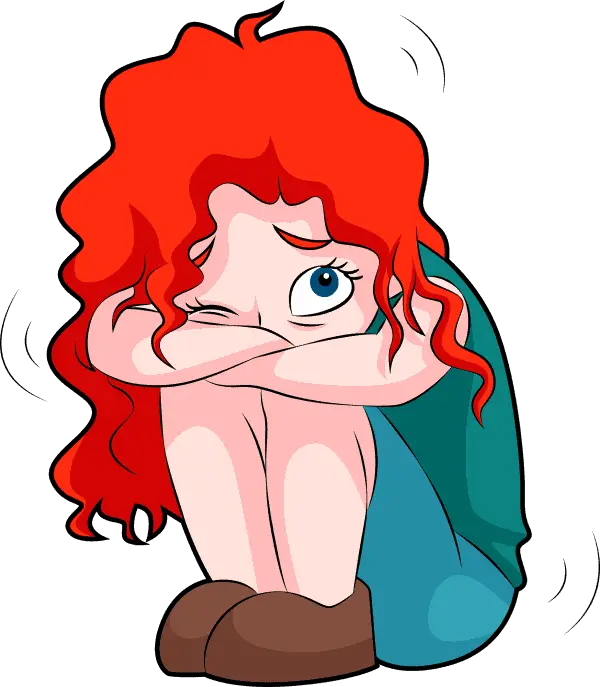Have you ever experienced a time when you got the giggles and just couldn’t get ahold of yourself? This is especially problematic during serious moments or when you’re not able to be excused. So what do you need to know about holding in laughter?
Holding in laughter is not generally a problem or dangerous to you or others, though it can be physically or emotionally uncomfortable. However, not holding in laughter certainly can have problematic consequences, depending upon the situation, or even be a sign of mental or physical illness.
Though probably unintentional in most cases, holding in laughter can lead to comical outbursts. But serious issues can accompany either extreme of holding in laughter or not holding in laughter. I’ve found this issue quite interesting over the years as I researched it, and think you will too. Read on to learn more.

Contents
What Happens If You Hold In Laughter?
Holding in laughter is something we’ve all done from time to time, especially at inappropriate moments. So what happens if you hold in laughter?
When you hold in laughter, you’re likely to be dealing with moments when laughing isn’t socially or professionally appropriate. It won’t physically harm you, even if you experience slight discomfort. It’s a suitable trade off for not causing ramifications due to laughing when you shouldn’t.
Studies have long shown that laughing is physically good for you, specifically helping to improve vascular health, which is very important as we age. As well, as a teacher, I’ve found how crucial laughing is in education.
Having a good sense of humor is not only healthy mentally and physically for our students (and teachers), but it actually improves learning.
However, that’s not all laughter is good for!
In fact, other research even shows the non-health or education benefits of laughter, too. For example, Scott Weems, a Ph. D in cognitive neuroscience, wrote about this in Ha! The Science of When We Laugh and Why (available free with an Audible Membership). Weems addresses in detailed narrative how laughter is often successfully used as both a coping mechanism and a conflict resolution tactic.
So by suggesting purposes for holding in laughter, I am in no way trying to negate the plethora of laughter benefits (which are research proven!). No, instead, I’m acknowledging, like King Solomon once wrote, ‘there’s a time for everything.’
“There is a time for everything, and a season for every activity under the heavens:…a time to weep and a time to laugh…”
Ecclesiastes 3:1 and 4a
When you find you have giggles that you have to hold, then, what happens?
Well, for one, you’ll be a bit uncomfortable physically holding back the laughs. Your first reaction is to clamp your lips together which in turn causes your throat to tighten a bit. You may even feel your stomach to cramp up.
Sometimes you’ll find it’s difficult to contain your physical reactions to holding in laughter and you expel some spittle even or short groans, moans, or burps. Of course none of this sounds fun or pleasant to experience, but the alternative is probably much worse: laughing at inappropriate moments.
Pseudobulbar Affect: Laughing, or Crying, Too Much
Many of us might be surprised to learn that there is actually a disorder where people either cry or laugh uncontrollably. This is not exactly the same as holding in laughter, though it’s somewhat the opposite of it, and so, related. What is pseudobulbar affect, or laughing or crying without control?
Pseudobulbar Affect (PBA) is a disorder with uncontrollable laughter or crying. It’s often mislabeled as an emotional disorder and sometimes mistreated with medication for this. However, it is a neurological disease and usually is attached to other neurological illnesses or physical trauma.
Because laughter and crying are most commonly emotional reactions for people, it’s important to stress that PBA is not emotional.
PBA certainly can cause mental and emotional related stress, however. Those suffering from PBA have explained the emotional and mental toil they feel from not being able to control their laughing or crying and many have resorted to isolation due to being misunderstood.
For more related reading, I suggest you try these:
- What To Know About A Lost Sense Of Humor
- Why Does My Child Laugh When Someone Gets Hurt?
- Comedy And Humor Are Subjective (And That Matters)
How Do You Hold In Laughter?
Other than instances of PBA, most people can be expected to contain or hold in laughter when necessary. How do you hold in laughter, then?
You can hold in laughter in order to avoid social awkwardness or professional consequences. From mental redirection like thinking of unpleasantness to physical distraction like biting your tongue or pinching your arm, there are sound steps you can take when you need to hold in laughter.
So, first of all, what are some times when you should hold in laughter?
- In class- Teachers are notoriously annoyed if students laugh at inappropriate times like during independent work time, during a test, or when the teacher is providing instruction. Laughing can cause those taking a test to be distracted and do poorly, and likewise, so can laughing during instruction.
- In church- During somber times like Mass or church service (i.e. ‘preaching), it’s not suitable for laughter. Of course, this is not taking into account the times when the priest or pastor is telling a cheesy joke!
- At a funeral- This is probably the least appropriate time to laugh, even if it might be a good time for some levity.
- At a hospital- Just like with a funeral, most people in a hospital are worried and in pain. This is not usually a time for giggles.
- During an interview- When you want to put your best ‘professional’ foot forward, you probably should hold back any laughs. You want to see amiable and personable, but you also want to be taken seriously and so, holding back giggles and guffaws is recommended.
So now let’s consider best suggestions for holding in laughter.
- Mental Redirections: Here are some of my top ideas for mentally redirecting yourself.
- Think about something unpleasant like a sad moment in your life or something distasteful happening. Recalling on something sad can help you focus on the non-funny moment you are currently in.
- Think about something serious. Doing this can help you focus on the seriousness of the situation, especially if you are at a hospital, religious service, or even a funeral.
- Think about goals in your life. When you ponder big moments for your life, you’re more likely to become composed.
- Focus on what’s actually happening in the moment. Often times, our giggles and laughter are because we are getting sidetracked and not paying attention to what’s actually going on around us. Focus on others, so you’re less likely to get distracted by laughing.
- Think of questions to ask whoever is in the moment with you. This is especially helpful if you are in a professional setting such as an interview. Redirecting your thoughts for your current situation-that is, thinking of questions to ask someone else-will help you to be less prone to silliness and laughter.
- Physical Distractions: Here are some of my top ideas for physically distracting yourself.
- Bite the inside of your cheek or your tongue (yes, literally bite your tongue!). This is a physical distraction to calm yourself in the moment. And by focusing directly on your mouth area, you’re being more intentional to using that area for something other than laughing!
- Pinch your arm or thigh-whatever is more discreet. The sharp pain will help you reorient to the serious moment you are in. As for whether or not this is more helpful than biting your cheek or tongue is personal. Try them both and see which works better for you!
- Moving away from the comical source. If you are able, get up and move from whatever is causing you to laugh-when you’re not in an appropriate venue or moment for laughter. Walking away might be the best distraction!
- Yawn or cough. Sometimes just doing something other than laughing with your mouth is enough to help you contain or hold in laughter.
- Talk. Rather than giggle or laugh out loud, instead ask questions, make oral observations, or start a discussion, if applicable. If you find you’re in a meeting and you suddenly are overcome by the giggles, rather than burst by trying to hold back laughter, talk. Talking is a way to physically and mentally (because you have to first come up with what to say in your mind before saying it aloud) redirect and distract yourself from laughter.
Of course, what works best for one person to hold in laughter might not work at all for someone else. It’s important to be open minded about these suggestions and flexible in your practice. If something doesn’t work for you the next time you need to hold in laughter, then be flexible and willing to try something else.
Why Is It So Hard to Hold in Laughter?
We’ve all experienced the giggles and recognize that there are times when giggling is not just inappropriate, but really, just down-right wrong. So then why do we do it? Well, it’s hard to hold in laughter! But why is it so hard to hold in laughter?
It’s hard to hold in laughter because laughing is a natural, physical response and is something we rarely think about before doing it. But keep in mind just because it’s difficult to do, doesn’t mean it’s impossible or unnecessary.
For some people, their career choices make it necessary to hold in laughter most of the time. For instance, news anchors are tasked with providing factual information. This means their delivery should be unbiased and formal. Getting the giggles when giving the news about world events or local crimes is hardly appropriate.
Another career where holding in laughter is probably expected is with the health field. Most doctors, nurses, or even emergency medical technicians deal with serious issues and laughter is not usually connected. Just imagine being admitted to the ER because of heart palpitations and the attendant laughing out loud. Not expected, to say the least!
However, people are indeed human and our human emotions include laughter.
And how many of us think ‘that’s funny, I believe I’ll laugh now’ prior to laughing? Not likely, is it?!
So one main reason we have trouble holding in laughter is because we aren’t thinking about it before we start laughing. Then, once we laugh and realize we shouldn’t be laughing, it’s sometimes difficult to get it under control because we’ve already started the ball rolling, so to speak.
Once we start laughing during an inappropriate time, nervous laughter also takes hold. So then, all of a sudden we feel really silly and embarrassed for laughing when we shouldn’t and that leads to, you guessed it, more laughing!
It just becomes one big cycle of laughter!
We can witness this ‘laughter cycle’ when watching others laugh uncontrollably… when they shouldn’t, and have difficulty stopping it. If you are one of the few who hasn’t witnessed this before, just watch some videos of news casters with the giggles. You’ll quickly feel embarrassed for them, but also, feel like laughing yourself!
Last, from my experience as a teacher and mom, one of the major reasons for why it’s so hard to hold in laughter is that it’s always difficult to stop doing what we’re not supposed to. From biting our fingernails to eating too much to smoking cigarettes, it’s hard to stop doing stuff we know we shouldn’t.
Most of us know we shouldn’t be laughing at certain things or in certain circumstances, but from time to time, we do it anyway. It’s sometimes just simply hard to hold in laughter, not impossible, though. So just because something might be hard, don’t let that stop you from trying.
As I used to tell my students, ‘You can do hard things!’
Why Should You Hold in Laughter (and Not LOL)?

As mentioned already, there are many times you should hold in laughter, mostly due to appropriateness of the immediate situation. But are there other reasons why you should hold in laughter?
You should hold in laughter when professional or social situations call for it. For example, during an interview you need to present yourself competent and laughing may detract from that. Other times, it may be necessary to hold in laughter to spare someone embarrassment or soften an awkward moment.
If you are in the midst of a serious event or momentous occasion and laughter isn’t part of it, it’s prudent to hold in laughter. Even if your laughter is a result of nervousness or anxiety, try to compensate for that feeling and avoid laughing. As already provided, there are some concrete steps you can take to hold in laughter when you should.
Sometimes, someone does something unintentionally silly or out-of-the-ordinary and you find yourself laughing in response to that. However, it’s likely your laughter is going to cause additional embarrassment to that person. In those situations, you need to what you can to hold in laughter.
A bit of physical discomfort for you is probably not a big deal in comparison to sparing the other person’s feelings.
The Takeaway of Holding in Laughter
Holding in laughter is not generally a serious problem for people, but if you aren’t able to hold in laughter such as someone with a health issue or refuse to hold in laughter when it’s inappropriate, problems are likely to occur for you.
To recap what was learned:
- Holding in laughter is something common for everyone at one time or another in life.
- There are real steps you can take to help hold in laughter when necessary.
- Some specific circumstances, events, or even careers are less agreeable to laughter so it’s prudent to be aware of this.
- Pseudobulbar affect is a specific neurological disorder that is characterized by uncontrollable laughter or crying and is socially uncomfortable for those afflicted.
I hope I was able to provide you with some background on holding in laughter. For further reading on laughter, I recommend these articles:
